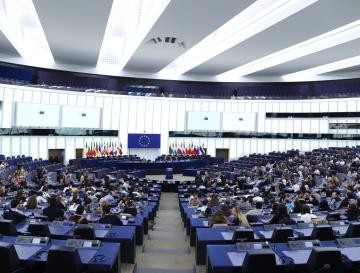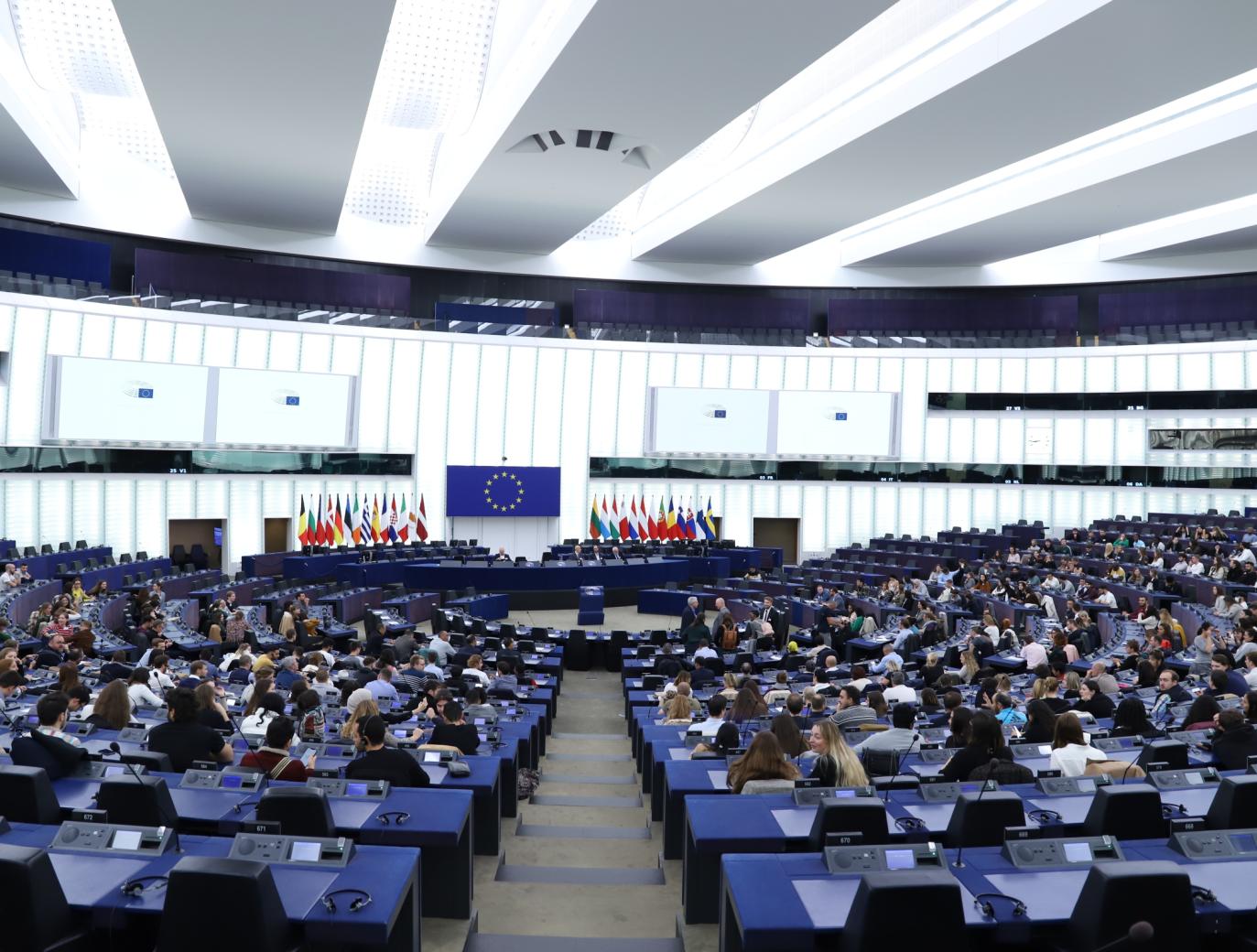
On Friday, October 14, 2022, nearly 500 master’s students from EM Strasbourg Business School (EMSBS) attended a conference-debate on the theme of Industry 4.0. Taking the seats of MEPs in the chamber of the European Parliament in Strasbourg, they were able to learn about and discuss digital challenges facing industry. This three-hour conference brought together four MEPs, two business representatives, and EMSBS professors. Here is a look back at this major event, the highlight of the CLUE* cross-program course set, which ensures that all EMSBS students have a European and multicultural learning experience.
Enrico Prinz, the School's director of internationalization and co-organizer of the event, gave the opening address, underlining “the freedom of expression that the European Parliament in Strasbourg so strongly represents.” As for Daniela Senk, head of Strasbourg conferences and services to visitors unit, she stressed its political relevance by mentioning how the legislation voted in the chamber has a daily impact on our lives and by reminding students that their vote during the 2024 European elections is important and not to be taken lightly. Kevin Mac Gabhann, associate dean for international relations at EMSBS, emphasized the political and societal significance of the very setting of the conference by reiterating that the European Parliament is the largest directly elected parliament in the world, tasked with adopting legislation and the annual budget for all the member states of the European Union. Being the only business school in France—and perhaps in the world—to have the privilege of organizing an event in this chamber is a true honor.
The conference-debate then got to the heart of the matter with a presentation by Jean-Philippe Bootz, associate professor at EMSBS and head of the Observatory of the Future. He presented the results of a prospective study conducted in 2021/2022 within the framework of the Observatory of the Future on the theme of uberization and industry in 2030. For this study, four scenarios were selected in order to identify the threats, opportunities, and challenges arising from them. The objective: to define concrete actions to be implemented.
- Hyperconsumption: Industry 4.0 as a service, focus & resistance to uberization
- Green digital technology: Circular economy 4.0 & selected uberization of production
- Technological crash: Crises, relocation & obsolescence of uberization
- Technology+: Industry 4.0 & blockchain, the era of new models
In addition to this prospective approach, the students were then able to learn about the political challenges of Industry 4.0 at the European level. Four MEPs shared their thoughts on this topic: Anne Sander, quaestor and member of the School Board of Trustees, Lina Galvez Munoz, vice-chair of the Committee on Industry, Research and Energy, François-Xavier Bellamy, member of the Committee of Industry, Research and Energy, and Christophe Grudler, member of the Committee on Industry, Research and Energy.
Finally, to complement the academic and political perspectives shared, representatives of the business world gave two presentations that were followed by a question-and-answer period. Jean-Sébastien Holl, I4.0 program manager of manufacturing at Hager, and Stefan Heitz, senior manager digital transformation in manufacturing of electrical drives at Bosch, discussed the digitalization strategies implemented in their respective companies as well as the challenges they face on a daily basis.
At Hager, Industry 4.0 is defined as “lean manufacturing and operational excellence.” For Jean-Sébastien Holl, “Industry 4.0 must be integrated into something much broader than technology, and at Hager that means a collection of interconnected projects. It's about opening up the world of possibilities through new technologies.”
According to Stefan Heitz, digital transformation is the product of a paradigm shift and the need to move away from a silo approach. It involves investing heavily in technology and specific software development, while always keeping the end user in mind. He concluded his remarks by explaining that everyone—regardless of his or her sector—is going to have to deal with digitalization, which is not a trend but a reality that is here to stay.
* CLUE: Cross-cultural skills, Language excellence, Uncommon activities, European leadership
